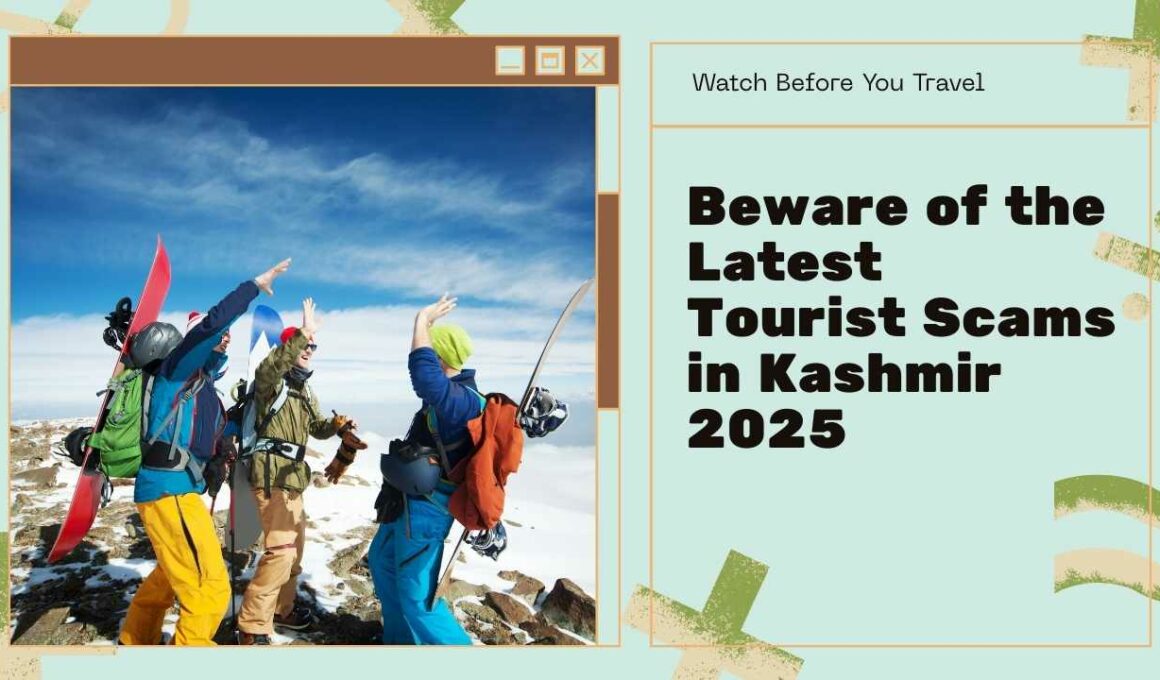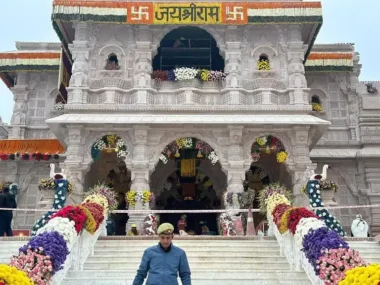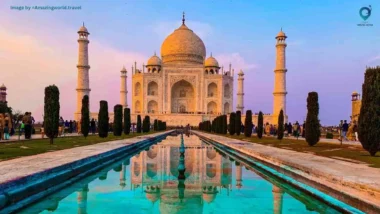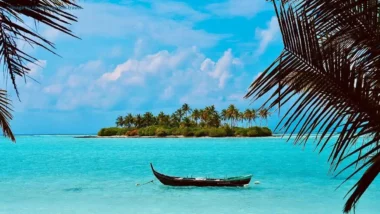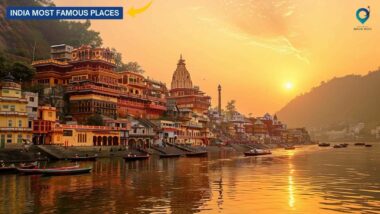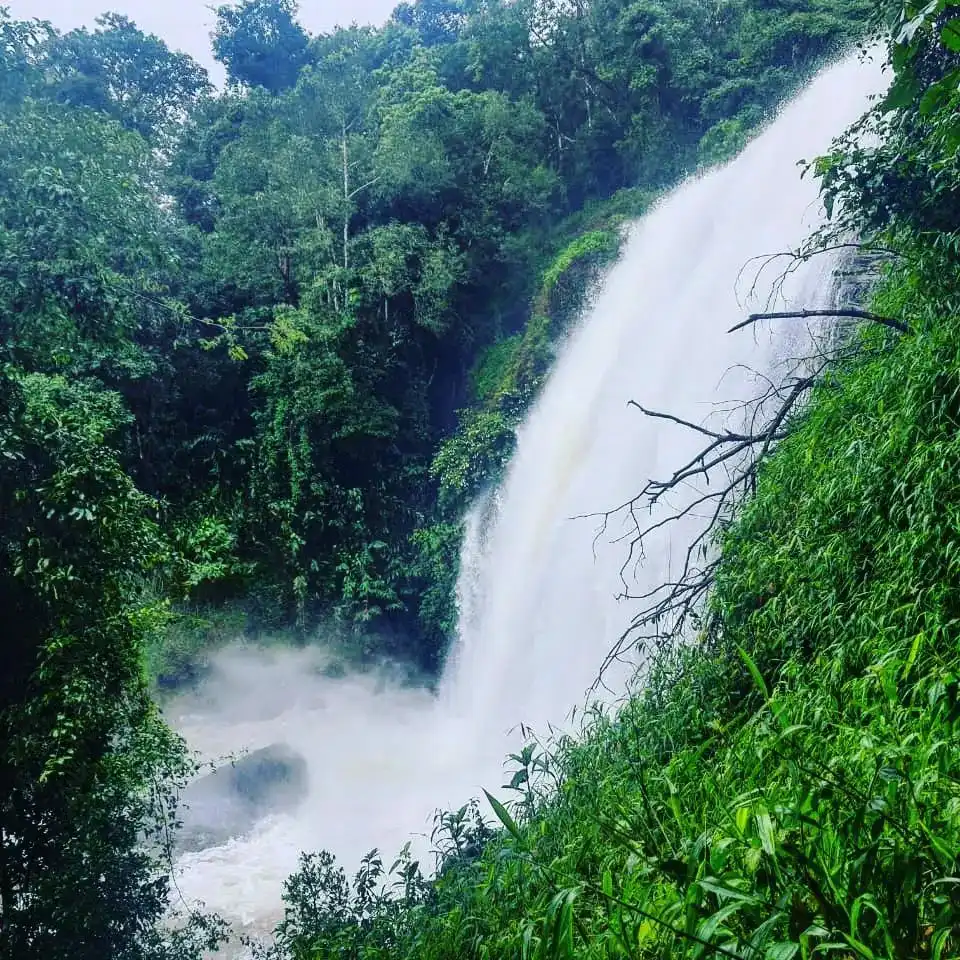
Kashmir is a dream destination for many. Snow-capped mountains, peaceful lakes, and beautiful gardens—everything looks straight out of a postcard. But during my last visit in early 2025, I realized that not everything is as perfect as it seems. While the beauty of the place is real, some of the experiences can be very disappointing—especially when you fall for common tourist scams in Kashmir.
At the Srinagar airport, I was approached by a man who offered me a full-day taxi tour at a “special price.” He sounded polite and convincing, so I agreed. But within two hours, I was taken to three shops and asked to buy things I didn’t even want. The so-called “tour” ended early, and I was overcharged by nearly ₹2,000. I felt cheated, and that’s when I decided to learn more about these scams.
In this article, I’ll share the latest tourist scams in Kashmir (2025 update), how to identify them, and simple tips to protect yourself. Whether it’s fake tour guides, overpriced Shikara rides, or houseboat booking frauds, this guide will help you stay safe and enjoy your trip stress-free.
Why Tourist Scams Are Rising in Kashmir

Tourist scams in Kashmir have risen due to the increasing number of visitors in recent years. With more tourists flocking to the region, scammers take advantage of those unfamiliar with local rates for services like shikara rides, pony trips, and tours. The lack of strict regulation and monitoring in the tourism industry also allows fake agents and unauthorized operators to exploit travelers.
Many tourists still rely on cash payments and unverified recommendations, making them vulnerable to scams. Additionally, high unemployment in the area has pushed some locals to resort to dishonest practices for quick money.
Most Common Tourist Scams in Kashmir (2025 Update)

1. Fake Tour Guides: A Personal Experience

During my recent visit to Kashmir, I had a first-hand encounter with a common scam involving fake tour guides. It started at Dal Lake, where a seemingly friendly man approached me with an offer of a “private” tour for ₹800. He seemed knowledgeable and promised to show me the hidden gems of Kashmir, so I agreed. However, what followed was disappointing.
Instead of visiting the iconic spots I was eager to see, he took me to a few overpriced souvenir shops, claiming they were “local artisan spots” that tourist often missed. I spent more time in the shops than at actual tourist sites, and the so-called “tour” lasted barely two hours. I ended up paying the ₹800, but it was far from the value I expected. In hindsight, I realized I had been charged way more than what the actual price of a standard tour would have been.
How to Avoid:
- Book through reputable agencies: Always go for government-approved tour agencies or book guides through your hotel or trusted websites.
- Politely decline unsolicited offers from people claiming to be guides, especially at crowded tourist spots like Dal Lake or airports.
- Verify credentials: If you do hire a guide, ask to see their registration or credentials. Most official guides will have a badge or card proving their legitimacy.
By taking these precautions, I could have easily avoided being misled into an unworthy experience. If you’re planning a trip to Kashmir, it’s essential to do some research before hiring any guide.
2. Overpriced Taxi & Shikara Rides: A Common Trap

Another common scam that many tourists face in Kashmir is being overcharged for taxi and Shikara rides. I experienced this myself near Dal Lake. A local offered me a Shikara ride for what seemed like a fair price—₹600 for one hour. But once the ride began, the boatman extended the ride slightly and then claimed it lasted longer than agreed, demanding ₹1,200 instead.
With taxis, it’s a similar story. At the Srinagar airport, I once took a cab to my hotel just 12 km away. I was charged ₹1,500 for a ride that should’ve cost no more than ₹500–₹600. Since I hadn’t pre-booked through a taxi union or app, I had no way to dispute the fare.
How to Avoid:
- Use prepaid taxi counters at the airport or book rides through trusted apps or your hotel.
- Agree on a fixed fare in writing or through WhatsApp/text before starting any Shikara or taxi ride.
- Ask locals or your hotel about standard rates beforehand to avoid being quoted inflated prices.
This scam is subtle because it often feels like you’re paying for a peaceful experience—but don’t let the calm waters fool you. Always stay alert and confirm costs up front.
3. Fake Handicrafts & Saffron: Looks Authentic, But It’s Not

Kashmir is famous for its beautiful handicrafts and pure saffron—but unfortunately, scammers know this too well. Tourists are often taken to specific shops by drivers or unofficial guides where prices are heavily inflated, and the products may not be genuine. For example, what’s sold as pure Kashmiri Pashmina may actually be machine-made wool from outside the region. Similarly, saffron offered at ₹300 per gram might turn out to be dyed corn silk or mixed with other fillers.
Real-Life Tip:
I once bought a “Pashmina” shawl from a lakeside vendor for ₹2,000. Later, a certified shopkeeper showed me how it failed the basic tests (like the burn test). I realized I had been duped.
How to Avoid:
- Always buy from government emporiums or certified stores.
- Ask for authenticity certificates and compare prices at multiple places before purchasing.
- Be cautious of “special discounts” or emotional stories pushing you to buy immediately.
4. Houseboat Booking Scams: What You See Isn’t Always What You Get
Many tourists dream of staying in a luxurious houseboat on Dal Lake. But some scammers use fake photos or misleading websites to take online bookings. Once you arrive, the houseboat either doesn’t exist, or is in very poor condition. Some tourists even report being asked to pay more on arrival due to “sudden price changes” or “unforeseen taxes.”
Real-Life Tip:
A friend of mine booked a houseboat for ₹3,000 per night online. But when she reached, she found a completely different boat—old, unclean, and not even in the same location as advertised. The owner refused a refund.
How to Avoid:
- Book houseboats only through well-known platforms or your hotel’s travel desk.
- Check Google reviews and recent traveler photos before confirming.
- Avoid paying the full amount in advance unless you trust the source.
Check this post- 28 Underrated Summer Destinations You Must Visit
5. Hotel Switching Scam: “Your Hotel is Closed” Trap

One common scam in Kashmir targets tourists who pre-book budget hotels. On arrival, taxi drivers or fake guides tell you that your hotel is either “closed,” “unsafe,” or “inaccessible due to unrest.” They then offer to take you to a “better” hotel—usually one where they get a big commission. These alternative hotels are often more expensive and may not meet basic standards.
Real Example:
A tourist booked a hotel online for ₹1,800 per night. Upon arrival, the driver claimed the hotel was under renovation and took them to another one charging ₹3,500 per night—with no refund from the first booking.
How to Avoid:
- Call your booked hotel in advance to confirm your reservation and operating status.
- Avoid taking suggestions from unsolicited drivers or middlemen.
- Arrange for a hotel pick-up directly if possible.
6. Forced Shopping Stops: “Just Take a Look” Turns Expensive

While on a sightseeing trip, some drivers or guides may stop at specific shops claiming it’s “just for a short visit” or “famous for local products.” These shops sell handicrafts, shawls, carpets, or saffron—usually at much higher prices. Tourists often feel pressured to buy something, especially after being served tea or shown around for a long time.
Real Example:
One traveler shared how their guide took them to a carpet store where prices started at ₹20,000. Though they had no plan to buy anything, the staff insisted and followed them to the car when they tried to leave without buying.
How to Avoid:
- Clearly communicate to your driver that you only want to visit tourist spots.
- Stick to your itinerary and don’t hesitate to say no to “quick shopping stops.”
- Use prepaid tour packages where shopping stops aren’t included.
Also, Read: – India Most Famous Places: 16 Must-Visit Tourist Attractions
7. Bogus Pony Ride Packages in Gulmarg & Sonmarg
In tourist hotspots like Gulmarg and Sonmarg, pony rides are popular for exploring scenic areas. However, scammers take advantage by offering overpriced or fake pony ride packages. They claim certain spots are inaccessible by foot or that tourists are required to take ponies to reach top points, which is often false.
Real Example:
A couple was charged ₹3,000 per person for a ride that should have cost around ₹700-₹1,000. The pony ride lasted only 15–20 minutes and didn’t even cover the promised route.
How to Avoid:
- Don’t agree to rides without checking with local tourism counters.
- Ask locals or hotel staff for the actual distance and if pony rides are necessary.
- Negotiate prices clearly beforehand and confirm the route included.
8. Bogus Entry Ticket Charges

At some tourist points, you may be stopped by locals or fake guards claiming there’s an “entry ticket” fee—especially in remote spots or near gardens and valleys. These tickets are often printed on plain paper and are completely unofficial.
Real Example:
A group was charged ₹100 per person at a viewpoint by someone in casual clothing who looked “official.” Later, they found out the area had no entry fee at all.
How to Avoid:
- Look for official signage or ticket counters before paying anything.
- Refuse to pay cash to individuals standing away from the main gate or without proper ID.
- If unsure, ask your hotel or guide beforehand whether a ticket is needed.
How to Identify and Avoid These Scams

Traveling to Kashmir can be a magical experience, but being aware of common scams and knowing how to avoid them can save you from unnecessary stress and loss of money. Below are some detailed tips to help you recognize and stay safe from tourist traps in 2025:
1. Do Proper Research Before Your Trip
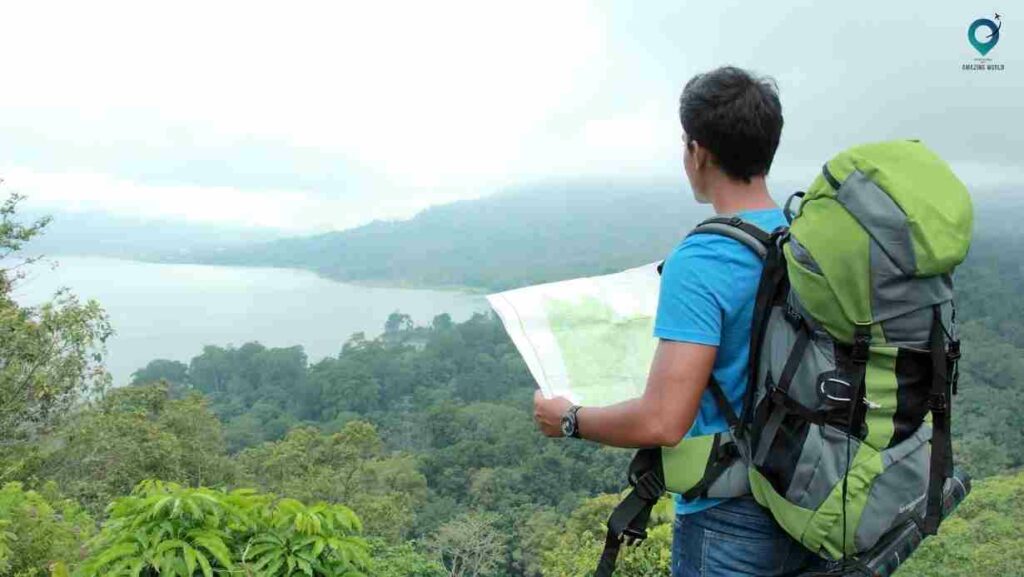
Before you even land in Kashmir, spend time researching:
- Average costs of taxi rides from the airport to city areas (₹700–₹1,200)
- Typical Shikara ride prices (₹500–₹1,000 for 30–60 mins)
- Houseboat stay costs (usually ₹2,000–₹4,000 per night)
- Prices of saffron, pashmina, and other local crafts
Reading travel blogs, watching recent YouTube vlogs, or joining Kashmir travel groups on social media can give you real-time insights. Knowing this baseline helps you identify when someone is trying to overcharge.
2. Only Book Services Through Trusted Platforms

Whether it’s a hotel, taxi, Shikara, or pony ride, book through:
- Reputed websites (MakeMyTrip, Goibibo, Booking.com)
- Government tourism portals (JKTDC, Incredible India)
- Your hotel or homestay (they often know legit local guides)
Avoid accepting offers from strangers at airports or tourist sites—even if they look friendly and professional.
3. Always Ask Hotel Staff or Locals You Trust

Hotel receptionists or homestay owners are familiar with current scams and real prices. If someone offers you a tour or shopping deal outside, always double-check with your hotel first. Locals who aren’t trying to sell you something are your best advisors.
4. Negotiate & Fix Prices Beforehand
This is one of the most important steps. For example:
- A pony ride in Sonmarg may be quoted as ₹2,500 for a full ride but could later turn out to be just a short 10-minute trip if you didn’t clarify.
- A Shikara ride may begin at ₹500 but then claim extra charges for “extra spots,” photos, or flower purchases.
Ask clearly:
- What’s the total amount?
- Is it per person or for the group?
- Is the ride round-trip or one-way?
- How much time is included?
Get it written if possible or take a photo of the person and vehicle as a safety measure.
5. Check IDs and Credentials
If someone claims to be a licensed guide, taxi driver, or tourism official:
- Ask to see their ID or license.
- Genuine guides in Kashmir are usually registered with the Tourism Department and carry official badges.
- Most legit taxis also have clear registration and rate cards displayed.
Don’t feel shy to ask. A real professional won’t hesitate.
6. Beware of Aggressive Sellers or Pressure Tactics
Some scammers use psychological tricks—like rushing you, surrounding you with a group, or making you feel guilty or unsafe—to force you into buying something or accepting a ride.
If something feels off, it probably is. Politely say no and walk away. You’re not obligated to say yes just because someone is being persistent.
Must Read blog: – Top 14 Mysterious Places in India
7. Report Scams or Suspicious Behavior

If you face any fraud or feel cheated:
- Note down names, phone numbers, vehicle registration numbers, and take photos if possible.
- Report the incident to your hotel or the Tourist Police in Kashmir.
- You can also inform the local police station or lodge a complaint online on tourism websites.
Authorities do take action, especially if they get multiple complaints about the same people or groups.
Conclusion
Kashmir is truly one of the most beautiful places in the world—its mountains, lakes, and culture offer an unforgettable travel experience. But like many popular tourist destinations, it’s not immune to scams. Whether it’s fake guides, overpriced rides, or forced shopping detours, being aware of these tricks is the first step to avoiding them.
By staying informed, booking through trusted sources, and trusting your instincts, you can protect yourself from being taken advantage of. Don’t let a few bad experiences ruin the magic of Kashmir. Travel smart, stay alert, and you’ll come home with memories—not regrets.
If you found this guide helpful, share it with friends planning a trip to Kashmir in 2025—it might save them thousands of rupees and a lot of stress!

Meet David Hoper, a passionate travel Blog writer with 7+ years of experience in travel content. Through his exemplary storytelling and engaging narratives, he shares his experiences and brings destinations to life. With a keen eye for detail and a love for exploration, he has cultivated a diverse portfolio of travel blogs that inspire and inform readers worldwide.
